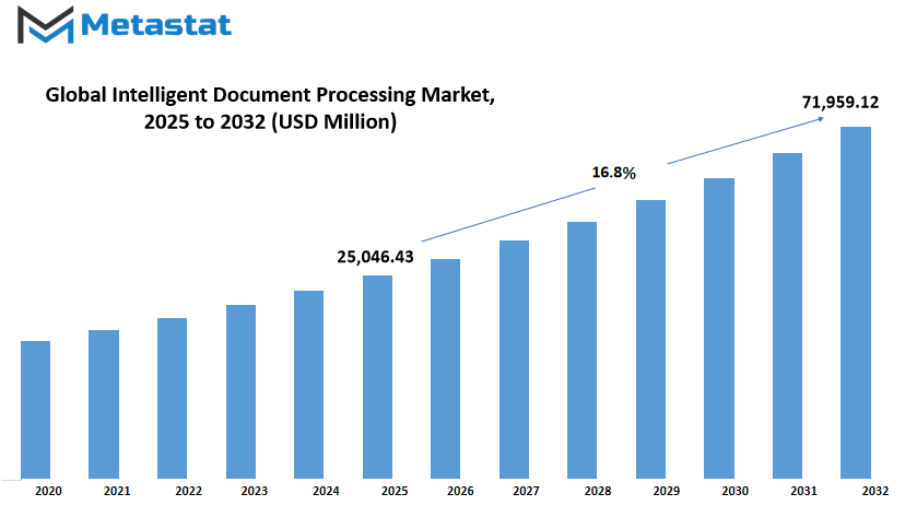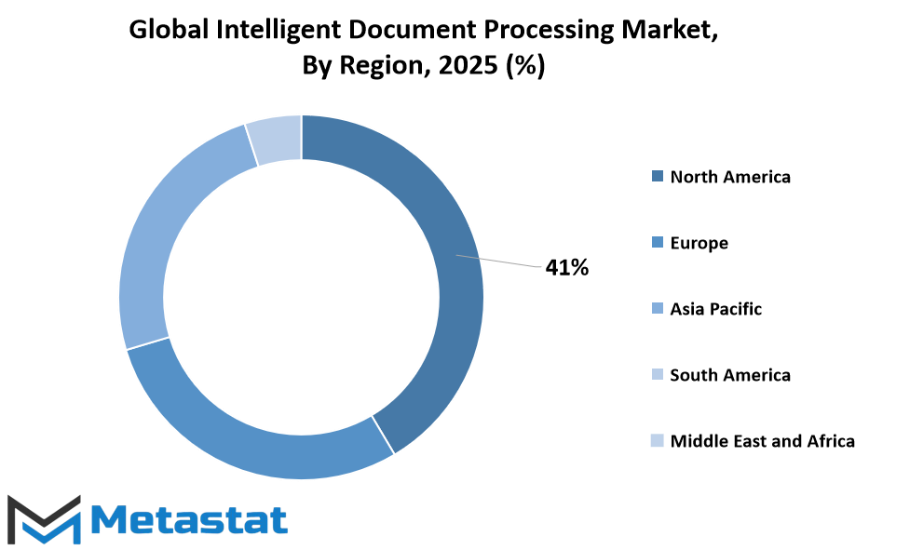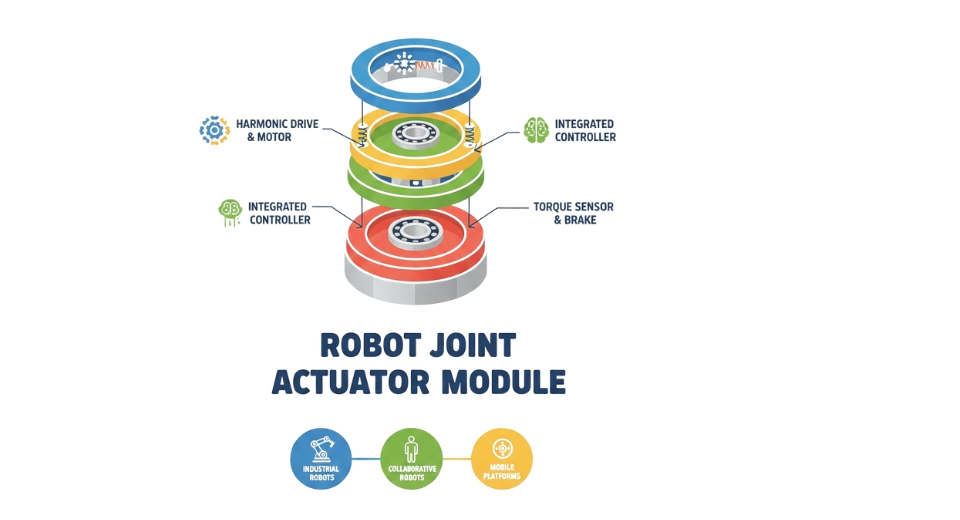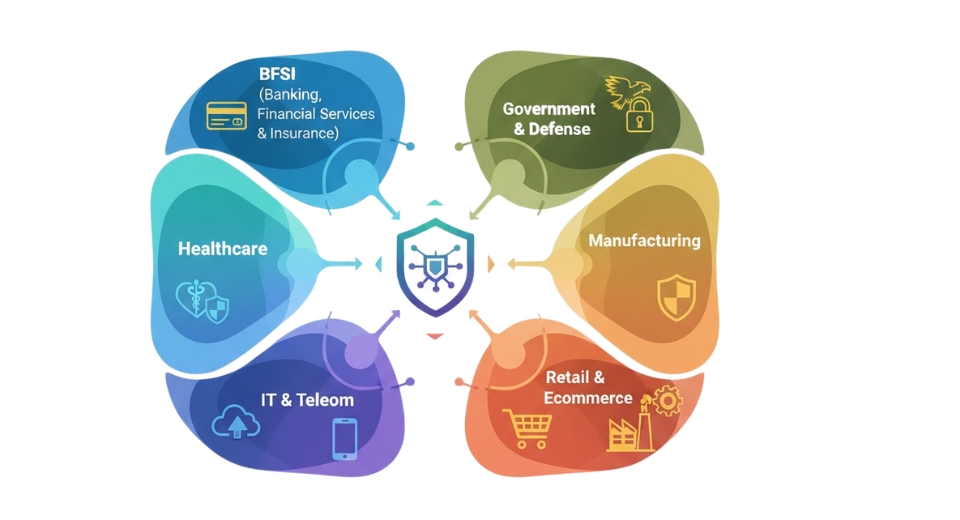MARKET OVERVIEW
The global intelligent document processing market is a technology niche that will remain in focus as businesses seek to tap into sophisticated methods of dealing with information buried in unstructured documents. This market will not just be a software category but will be an indication of a movement in which information trapped in paper documents, scanned documents, emails, and online forms will increasingly become available and actionable in an organized way. Companies across industries will look for products that manage this complexity accurately, so that important insights can be gleaned from information that was previously hard to process in bulk.
At the heart of this market will be technology that combines optical character recognition, natural language processing, and machine learning algorithms to transform documents into structured outputs. These functions will no longer be considered add-on tools; they will be essential assets for organizations wishing to minimize manual effort and prevent errors arising from conventional methods of data entry. Through the potential to change thousands of documents in hours rather than weeks, intelligent document processing offerings will set the tone for how businesses process compliance, reporting, and decision-making in the future.
Its importance will not be confined to one industry. Banks will utilize it to process loan applications, invoices, and compliance reports more accurately. Healthcare professionals will embrace it for patient records, claims, and medical imaging reports where accuracy and confidentiality will be paramount. Insurers, government departments, and logistics companies will equally turn to intelligent document processing as a basis for processing the volume of documents their activities will inevitably necessitate. By doing so, the global intelligent document processing market will be a bridge between data disorder and business clarity across industries.
Aside from the obvious role of document automation, the market will become the foundation for digital transformation plans. Businesses won't be purchasing just scanning and sorting tools; they will be purchasing learning systems that have the ability to adapt to evolving document types and business rules. The ability of these systems to be integrated into larger enterprise platforms, including customer relationship management and enterprise resource planning systems, will further underscore their significance. By building a flow in which data will move smoothly across platforms, the market will demonstrate how information handling is capable of transforming entire workflows.
With organizations becoming international in scope, processing records in various languages and formats will be the other hallmark factor. The industry will not rest at going digital on English-centric documents but will advance to international communication, processing various languages and scripts with the same effectiveness. This capability will help multinational companies be uniform and consistent in dealing with activities across geographies.
Essentially, the global intelligent document processing market will be a critical connection between unstructured data and actionable intelligence. It will not be so much about removing people from the equation but about allowing them to concentrate on decisions instead of data entry. By transforming isolated bits of information into one source of insight, the market will make it possible for the global community to adopt a more structured and intelligent way of document management.
Global intelligent document processing market is estimated to reach $71,959.12 Million by 2032; growing at a CAGR of 16.8% from 2025 to 2032.

GROWTH FACTORS
The global intelligent document processing market is attracting attention with organizations searching for more streamlined methods to process high volumes of information. Companies in various industries create and process hundreds of documents on a daily basis, and conventional means of processing them include tremendous manual efforts, escalating the likelihood of human errors. Intelligent document processing is a solution to process such workflows automatically, which will be faster, more precise, and simpler to administer. This increased demand for automation is one of the most powerful drivers propelling the market. Increasing application of artificial intelligence and machine learning is another significant driver transforming the global intelligent document processing market.
These technologies enable systems to comprehend, categorize, and extract information more accurately with lesser need for human intervention. For most businesses, this equates to less time on mundane paperwork and more time on growth-driving strategic activities. AI and ML software will keep on developing, and as their dependability increases, the application of these tools within document automation systems will increase accordingly. Even with its promise, there are obstacles that can slow the market. One of the biggest hurdles is how hard it is to implement intelligent document processing solutions with legacy enterprise systems.
Many organizations use old software, and linking new technologies to these platforms can be complicated and expensive. Together with this, the high upfront costs of installing such solutions can be prohibitive, particularly for smaller companies. Concerns regarding data privacy also come into play, especially where there are sensitive matters involved, as in the case of finance and health. Automation should not undermine compliance or security, companies are required to ensure. In the future, expansion opportunities are apparent. The Global Intelligent Document Processing industry is expected to experience robust growth within sectors such as legal, banking, and health. These industries process enormous volumes of structured and unstructured data, and end-to-end automation can revolutionize the way they work.
To take the example of healthcare, smart processing can make patient records more secure and efficient. In banking, it can automate loan approvals and compliance verification, and in legal services, it can save time on contract review and documentation. As businesses increasingly appreciate the benefits of automating processes, intelligent document processing will be right at the forefront of transforming document management habits. Though there are still problems to overcome, the potential is much higher, and the market will continue to expand on a steady basis in the years ahead.
MARKET SEGMENTATION
By Component Type
The global intelligent document processing market is moving toward a future where businesses will rely more on advanced tools to manage and understand large amounts of data. As organizations continue to generate information at a faster rate, the need for smart solutions to process documents will become stronger. The market is shaped by two main component types, which are Solution and Services. Both of these will play a major role in how companies adopt and benefit from intelligent document processing in the years to come.
Solutions will remain the foundation of the global intelligent document processing market. These are the systems and technologies that automate the way documents are captured, read, and converted into usable data. In the future, solutions will not just focus on extracting information but will also improve accuracy through machine learning and artificial intelligence. Businesses will seek solutions that can handle a wide variety of document formats, languages, and even unstructured content. As technology improves, solutions will be designed to adapt quickly, making them more efficient and reliable. This progress will allow companies to reduce manual errors, save time, and make smarter decisions based on accurate information.
Alongside solutions, services will grow as an essential part of the global intelligent document processing market. Services will include consultation, integration, and support that help organizations make the most of their document processing systems. Many businesses will require expert guidance to set up and customize these systems according to their needs. Services will also include ongoing training, upgrades, and maintenance to ensure smooth performance. In the future, service providers will be expected to deliver more personalized assistance, helping companies stay updated with the latest advancements and security measures. This growing demand for services will ensure that businesses are not only adopting technology but also using it effectively.
Looking ahead, the combination of solutions and services will push the global intelligent document processing market into a phase where automation and intelligence go hand in hand. Companies will invest in solutions for efficiency while depending on services to guide them through the transition. The market will expand as more industries realize the benefits of intelligent document processing, ranging from cost savings to improved productivity. With technology continuing to advance, the future will see smarter, faster, and more adaptable systems supported by strong service models. This balance will make intelligent document processing a key part of how businesses operate in a digital future.
By Technology Type
The global intelligent document processing market is expected to play an increasingly important role in how organizations handle large volumes of unstructured and structured data. Businesses across different industries are already relying on digital solutions, but the demand for faster, more accurate, and automated document handling will continue to rise. The growing dependence on technology has made traditional manual processes seem outdated, and the global intelligent document processing market will be seen as a critical way to improve speed and reduce human error. With the shift toward automation, more companies will invest in these solutions to remain competitive.
By technology type, the global intelligent document processing market is divided into Machine Learning, Natural Language Processing (NLP), and Computer Vision. Each of these areas will drive growth in its own way. Machine Learning will allow systems to continuously improve as they process more documents, making future solutions smarter and more reliable over time. Natural Language Processing will be essential in understanding text, interpreting meaning, and even detecting intent from documents, emails, and other written communication. As businesses generate massive amounts of data daily, NLP will help in not only processing but also making sense of that information. Computer Vision, on the other hand, will bring accuracy in recognizing images, scanned papers, and even handwritten content. This combination will create a powerful set of tools that can handle nearly every type of document, making workflows faster and more efficient.
Looking ahead, the global intelligent document processing market will not only be about replacing manual work but also about reshaping how decisions are made. As technology advances, companies will be able to extract insights from documents in real time, which will improve decision-making across finance, healthcare, retail, and government sectors. For example, financial institutions will use these technologies to process loan applications quickly and accurately, while healthcare providers will depend on them to manage patient records and ensure data security.
The global intelligent document processing market will also benefit from the increasing use of cloud-based solutions. Cloud platforms will make it easier for businesses of all sizes to adopt intelligent processing without needing heavy infrastructure investments. This will make the technology more accessible, even to smaller organizations, creating wider opportunities for growth.
In the future, the global intelligent document processing market will be seen as more than a support system. It will become a foundation for digital transformation strategies, where businesses use automation not just for efficiency but also for gaining a competitive advantage. The combination of Machine Learning, NLP, and Computer Vision will ensure that document processing continues to evolve into a smarter, faster, and more adaptive system that aligns with the future needs of industries.
By End-user
The global intelligent document processing market will continue to expand as businesses and public institutions search for faster and more reliable ways to manage information. With the rising volume of unstructured data such as emails, contracts, invoices, and forms, companies will need solutions that not only capture documents but also understand, classify, and extract meaningful details from them. Intelligent Document Processing uses technologies like artificial intelligence, machine learning, and natural language processing to make this possible. As organizations move toward digital transformation, this market will play an important role in shaping how data is managed and decisions are made.
Looking ahead, the global intelligent document processing market will see strong growth because industries are realizing the value of automation. In the financial services sector, for example, banks and insurance firms will rely on these solutions to reduce manual paperwork, minimize errors, and handle compliance requirements more efficiently. Healthcare providers will use intelligent document systems to manage patient records, medical claims, and research data with improved accuracy, which will enhance both patient care and operational performance. In manufacturing, the technology will help manage supply chain documents, quality checks, and compliance reports, making processes more transparent and faster.
Retailers will also benefit as document processing will help them manage invoices, supplier agreements, and customer data more effectively, leading to better service delivery. Government and public sector institutions will use these solutions to modernize record keeping, reduce bureaucracy, and improve transparency in citizen services. Transportation and logistics companies will gain advantages by automating customs documents, delivery records, and freight invoices, helping them achieve smoother operations. In IT and telecom, intelligent document systems will simplify contract management, customer onboarding, and service requests, which will improve both efficiency and customer experience. Other industries, such as education and energy, will also see benefits as they adopt these technologies for smoother information handling.
From a futuristic standpoint, the global intelligent document processing market will not just be about reducing paperwork. It will increasingly become about enabling real-time insights. As systems get better at learning and predicting, organizations will be able to use data extracted from documents to forecast trends, identify risks, and make better decisions. With more industries embracing cloud-based platforms and advanced security, intelligent document solutions will integrate with other digital tools, creating a connected environment that supports growth and innovation. Over time, the market will evolve into a foundation for smarter workplaces, where information flows seamlessly and human effort shifts toward more creative and strategic tasks.
|
Forecast Period |
2025-2032 |
|
Market Size in 2025 |
$25,046.43 million |
|
Market Size by 2032 |
$71,959.12 Million |
|
Growth Rate from 2025 to 2032 |
16.8% |
|
Base Year |
2025 |
|
Regions Covered |
North America, Europe, Asia-Pacific Green, South America, Middle East & Africa |
REGIONAL ANALYSIS
The global intelligent document processing market is moving toward a future where the handling of information will be more seamless, accurate, and efficient than ever before. Organizations are steadily moving away from traditional manual methods and are embracing technology that will not only reduce errors but also enhance productivity. This market will play a significant role in how businesses approach data management, as the demand for automation continues to rise across industries such as healthcare, finance, manufacturing, and government. With companies generating massive amounts of documents daily, the ability to quickly extract, organize, and analyze information will become essential for maintaining competitiveness in the years ahead.
When looking at the global intelligent document processing market by geography, each region will contribute differently to growth. North America, led by the U.S., Canada, and Mexico, will continue to dominate as companies in these countries are early adopters of advanced technologies. Europe, which includes the UK, Germany, France, Italy, and the Rest of Europe, will follow closely behind, with its strong regulatory framework and increasing digital transformation initiatives fueling adoption. Meanwhile, the Asia-Pacific region, made up of India, China, Japan, South Korea, and the Rest of Asia-Pacific, will show the fastest growth rate, as emerging economies in this area are investing heavily in automation and artificial intelligence. The push for innovation in countries like China and Japan will set a high pace for adoption, while India will become a major hub for cost-effective solutions.
In South America, with Brazil, Argentina, and the Rest of South America, adoption will rise more gradually. However, as businesses in the region seek improved efficiency, they will increasingly turn toward Intelligent Document Processing to streamline their operations. The Middle East & Africa, which includes GCC Countries, Egypt, South Africa, and the Rest of the Middle East & Africa, will also see steady expansion. Governments in these regions are focusing on digitization to reduce dependence on paper-based systems, and this will create new opportunities for growth.
Looking ahead, the global intelligent document processing market will not only change how businesses manage data but also reshape decision-making itself. Automation tools will allow faster access to insights, enabling companies to respond to challenges in real time. As technology continues to improve, the market will move beyond basic automation and evolve toward predictive and adaptive solutions that will anticipate business needs. This future will bring smarter processes, higher efficiency, and a global economy that depends on data-driven intelligence.

COMPETITIVE PLAYERS
The global intelligent document processing market will continue to expand as more businesses adopt automation to manage their growing volume of data and documents. This technology is no longer just a support tool but is becoming an important driver for efficiency across industries. Organizations today handle large amounts of structured and unstructured data, and the ability to process, classify, and analyze this information quickly will shape how competitive they remain in the future. Companies are realizing that without intelligent automation, the time and cost required to manage documents manually will hold them back.
The competitive landscape in this market will play a significant role in shaping how fast innovations reach businesses and end users. Major players are focusing on creating platforms that are not only accurate but also adaptable to different industry needs. ABBYY has built its reputation by offering strong optical character recognition capabilities, which make document conversion faster and more reliable. AntWorks is pushing ahead with artificial intelligence that learns from smaller data sets, giving businesses flexibility when scaling their operations. Appian is using its expertise in low-code development to connect Intelligent Document Processing with broader automation solutions.
Automation Anywhere, Inc. is strengthening its offerings by combining robotic process automation with document intelligence, which will help companies build end-to-end automated workflows. Datamatics Global Services Limited is advancing with tools designed to improve data extraction accuracy, making it easier for firms to trust and act on their information. Hyperscience is bringing in machine learning that reduces the need for human corrections, which will be valuable as companies seek higher levels of straight-through processing. IBM Corporation is drawing on its global presence and AI research to integrate Intelligent Document Processing into broader enterprise solutions, offering a complete approach to document and data management.
Open Text Corporation is focusing on enterprise content management, linking document processing to information governance and compliance needs. UiPath is building momentum by offering solutions that blend automation with user-friendly design, helping businesses of different sizes adopt Intelligent Document Processing faster. Together, these players will continue to push the market forward by investing in innovation, expanding partnerships, and delivering products that solve real business challenges.
Looking ahead, competition among these leaders will encourage rapid development of more precise, secure, and scalable systems. This will ensure that the global intelligent document processing market grows steadily and provides organizations with the tools they need to work smarter, reduce errors, and make quicker decisions in a world that depends on fast and reliable data handling.
Intelligent Document Processing Market Key Segments:
By Component Type
- Solution
- Services
By Technology Type
- Machine Learning
- Natural Language Processing (NLP)
- Computer Vision
By End-user
- BFSI
- Healthcare
- Manufacturing
- Retail
- Government & Public Sector
- Transportation & Logistics
- IT & Telecom
- Others
Key Global Intelligent Document Processing Industry Players
- ABBYY
- AntWorks
- Appian
- Automation Anywhere, Inc.
- Datamatics Global Services Limited
- Hyperscience
- IBM Corporation
- Open Text Corporation
- UiPath
WHAT REPORT PROVIDES
- Full in-depth analysis of the parent Industry
- Important changes in market and its dynamics
- Segmentation details of the market
- Former, on-going, and projected market analysis in terms of volume and value
- Assessment of niche industry developments
- Market share analysis
- Key strategies of major players
- Emerging segments and regional growth potential








 US: +1 3023308252
US: +1 3023308252






